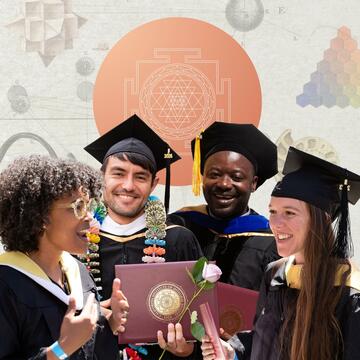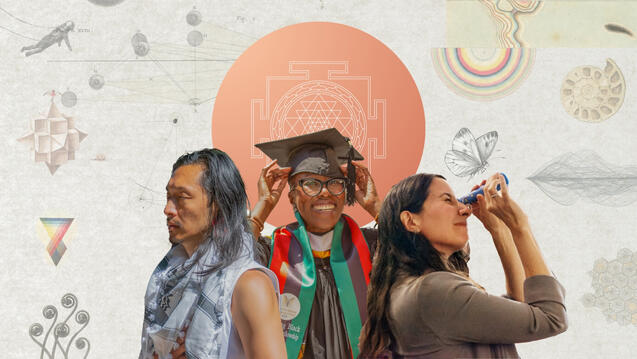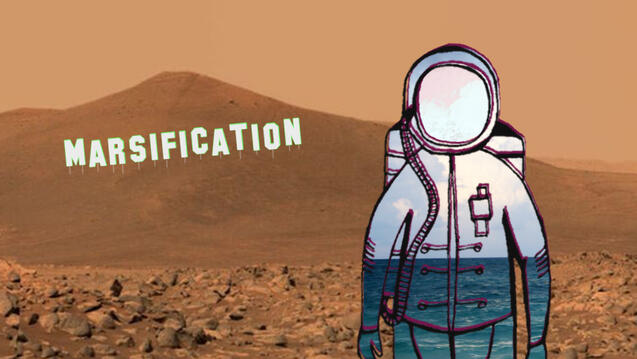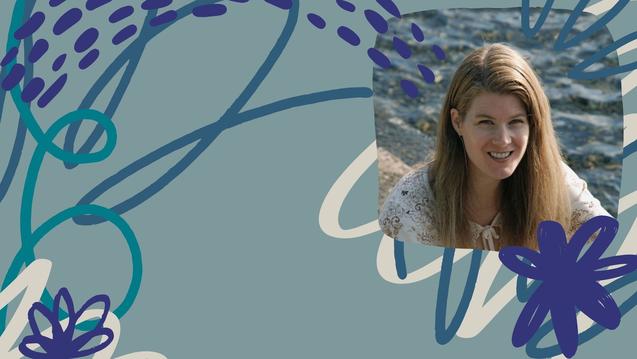At each CIIS Open House event, a community panel of faculty and alumni discusses what drew them to CIIS and their experiences at the University.

A Bachelor’s Degree for the Modern World
Discover how CIIS' School of Undergraduate Studies adapted to help students address today’s unique challenges with Bachelor Completion Programs.
For 20 years, the CIIS Bachelor of Arts Completion programs have led the way in helping students finish their degree, and achieve their personal goals and professional pursuits. We talked with Alec MacLeod, Professor of Interdisciplinary Studies, and Kris Brandenburger, Director of the School of Undergraduate Studies, which houses the degree programs, about its history and how the school adapted to help students address today’s unique challenges.
Alec, tell us about when, how, and why the Bachelor of Arts Completion program was founded.
Alec MacLeod (AM): In the early ’90s, CIIS frequently received inquiries as to whether we had an undergraduate program. Typically, students without a B.A. were inquiring about where to get their undergraduate degree in order to qualify for the CIIS graduate programs. In the summer of 1992, I was invited by Dean Elias, who had been hired by CIIS to start the School for Transformative Learning and its cluster of new programs, to help design an undergraduate degree completion program for nontraditional students (in this case, working adults above “college age”). That fall, I worked as a consultant with a small group of CIIS faculty and administrators to design the program. Our accreditors approved the program in February of the following year, and I was hired as the program’s inaugural director. Certainly, our initial recruitment indicated a pent-up demand, and the program has thrived for the past 29 years.
Kris, what is it like to be a student in the Bachelor of Arts Completion program? What were your most memorable experiences?
Kris Brandenburger (KB): I think that working with students from very different backgrounds was a significant part of the richness of the program for me. In addition to the variety of backgrounds, my cohort members ranged in age from their early 20s to their 70s, and I got to work closely with most of them over the span of the year. The combination of collaborative and personal work was also enormously valuable. I especially appreciated that I was allowed to follow my own interests in support of the larger learning objectives and curriculum.
“Critical pedagogy” is the bedrock of the program’s teaching philosophy. What does this term mean to you, and how has it shown up in other areas of your life outside the Bachelor of Arts Completion program?
AM: I grew up a critic of mainstream schooling in the U.S., reading John Holt and Ivan Illich as a teen. I was transformed by reading Paolo Freire’s Pedagogy of the Oppressed in college in 1972. The following Freire quote has guided me through my professional life as an educator:
“To be a good liberating educator you need above all to have faith in human beings. You need to love. You must be convinced that the fundamental effort of education is to help with the liberation of people, never their domestication. You must be convinced that when people reflect on their domination they begin a first step in changing their relationship with the world.” (1971)
I bring this wisdom not only to my teaching at CIIS, but also to my work as an Equity, Inclusion, and Diversity consultant for other organizations. For me, liberatory pedagogy is a philosophy of education that lives in relationships among co-learners: educators, students, the class as a whole. It is a pedagogy of love. My task as an educator is not to provide answers, but to help students pose beautiful questions and guide them to the tools and information that will help them find answers for themselves.
Cultural, social, and political conditions have changed dramatically since the mid-1990s. How has the Bachelor of Arts Completion program shifted and adapted?
AM: The first students to enroll were largely white ex-hippies who had dropped out of college in the ’60s and ’70s—those who had chosen professions that did not require a degree when they were younger—and a smattering of first-generation college students. Often, these students had been wounded in one way or another by their previous educational experiences. This is still true of some students, and over the years we have increasingly diversified in terms of race and class. We now admit a much larger number of first-generation students, formerly incarcerated students, military veterans, and others for whom traditional college pedagogy is less than appealing.
There have been generational shifts as well. Political and social attitudes are different, the very media through which we engage students has changed radically, and students are increasingly focused on pursuing graduate education. At the same time, the hopes and goals of our students have been consistent. They want to finish their bachelor’s degree. They want to make a positive difference in the world. They want an educational environment where they have flexibility to learn and express themselves in the ways that work best for them.
Many students use the Bachelor of Arts Completion program as a jumping-off point to enter a master’s or Ph.D. program at CIIS. How does the program prepare students for this higher-level academic work?
KB: Students are asked to prepare signature projects for each semester, as well as a senior project, which allows them to develop a sustained piece of work in an area of their own determination and interest. Both of these require specific and sustained focus, and this program provides training and support for those skillsets that are so necessary at the graduate level. Critical, creative, and integrative thinking are also required (and supported) as students make their way through the undergraduate programs at CIIS.
AM: Many of our students come because they are attracted to our graduate programs. Over time, about 25% to 35% of our students go on to graduate programs at CIIS, and another 20% to 25% go on to grad school elsewhere. I typically ask students about their educational goals and try to shape my response to their work accordingly. Critical thinking, writing, sourcing, and citing are the areas I tend to emphasize for those who want to do graduate work. I might also urge a student to take a graduate-level course in their area of interest to confirm their desire to pursue that path.
I believe that the program is similar to many graduate programs in that we emphasize skills in critical thinking, oral and written communication, and a range of methods for pursuing inquiry. Our graduates have learned to integrate and synthesize their learning, making it relevant to their lives and professional pursuits. These are skills that will serve them at the graduate level, much more than memorization and compliance with a professor’s expectations.
Kris, tell us about the Bachelor of Science in Psychology degree. Why did you develop this program, and what’s unique about it?
KB: The School of Undergraduate Studies had planned to add a psychology degree for several years, and the timing was good to go ahead with its development. I had developed an undergraduate psychology degree for another institution and was also free to return to working with CIIS. It was nice to come “home” to my alma mater to do such interesting work.
This is indeed a unique program: unique for CIIS, as it is a B.S. degree rather than a B.A. degree, and unique among undergraduate psychology degrees in its focus on both traditional Western psychology and psychologies from other cultures. We understand that most, if not all, cultures have practices and bodies of knowledge that correlate to the Western study of psychology, and we make sure that our students have a curriculum that embeds that understanding into its coursework.
We also work with contemporary and emerging fields of study such as neuroscience, transpersonal psychology, global perspectives, and trauma studies, all of which are quite unusual at the undergraduate level. Additionally, our faculty are all at the leading edge of research and practice in their own areas of interest and bring that vibrancy to our program.
What has this past year of COVID-19 been like for the Bachelor of Arts Completion program, and what are your dreams for the future of the program?
AM: From its inception, the program has continuously evolved by experimenting with different delivery strategies. So, while the events of this past year required us to adapt to virtual classrooms, this kind of adaptation is nothing new for us. What I hope will continue to be at the core is our commitment to listening to our students. We take their concerns and suggestions seriously. When we are told what does and does not work, we change and grow. In addition to the new B.S. in Psychology, I personally would love to see us offer new degrees or minors in education and the arts; I feel we have a lot to contribute to each of those areas.
KB: I am actively working with faculty in developing several concentrations to allow students to engage specific interests more deeply—for instance, neurodiversity studies and Black psychology. We are also in the process of adding an online version of our current B.A. in Interdisciplinary Studies, and we are developing a new degree in health, science, and technology. I am also interested in exploring international opportunities as we look beyond this moment. It is so clear that cross- and multicultural engagements are sorely needed in our fractured world, and I’d love to see the program be part of those larger possibilities as we work to bridge the gaps.
Alec MacLeod is Professor of Interdisciplinary Studies in CIIS’ School of Undergraduate Studies. He has over 30 years of experience as a facilitator of learning in higher education, both as a classroom teacher and as an administrator. He was a member of the design team for CIIS’ undergraduate cohort-based Bachelor of Arts Completion program and the inaugural director of that program. In addition to his interdisciplinary Bachelor of Arts Completion courses, Alec teaches courses in visual thinking, creativity, and visual culture.
Kris Brandenburger is the Director of CIIS’ School of Undergraduate Studies and an alum of the Bachelor of Arts Completion program (’96), as well as CIIS’ Ph.D. program in Individualized Studies/Humanities (’01). She has worked in several institutions serving as faculty, program chair, dean of faculty, and accreditation liaison officer.
Related Academic Programs
Bachelor Completion in Psychology, Psychedelics, and Interdisciplinary Arts
Related News
Zara Zimbardo and Lily Stone collaborated on the new album Marsification: A tale of planetary grief, featured on Radio 4’s Short Cuts.
New works from CIIS Professor of Clinical Psychology on the Psychological Potency of Dreams



